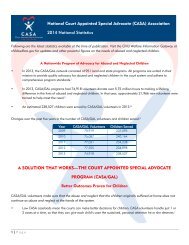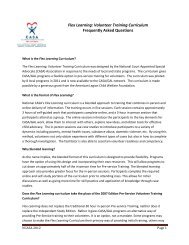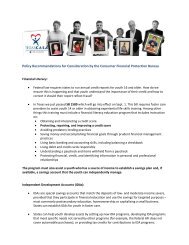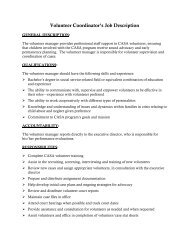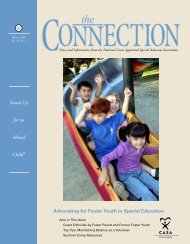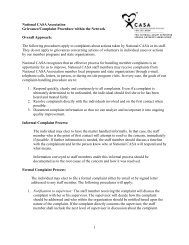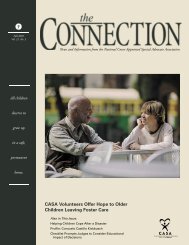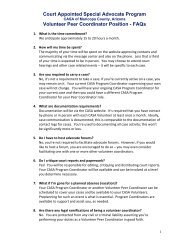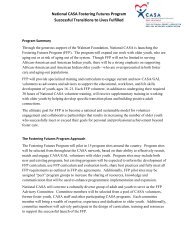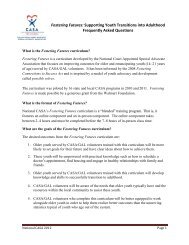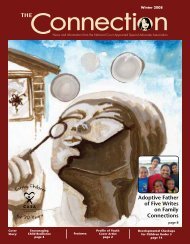CASA Programs and Judicial Ethics Introduction - National CASA
CASA Programs and Judicial Ethics Introduction - National CASA
CASA Programs and Judicial Ethics Introduction - National CASA
You also want an ePaper? Increase the reach of your titles
YUMPU automatically turns print PDFs into web optimized ePapers that Google loves.
power of the judiciary improperly. 31 However, you can certainly direct potential participants to contactthe appropriate <strong>CASA</strong> representative; this action would be taken in response to a question from theaudience. A better approach would be to have a <strong>CASA</strong> representative as a part of your presentation orpresent in the room while you are speaking. That person can let the audience know how to contactsomeone concerning participation in the <strong>CASA</strong> program.In scenario (2) you have asked the jury commissioner to pass out leaflets describing the <strong>CASA</strong>program to all prospective jurors. This request will place a new responsibility on a public employee. Abetter approach would be to have the leaflets available in the jury waiting room for anyone interested inthe <strong>CASA</strong> program. In this way you would not be asking a court employee to undertake a task that is nota part of his or her job description. You should inform the presiding judge of your effort to ensure thathe or she approves. It may be that the presiding judge would not approve of passing out fliers. TheTexas Committee on <strong>Judicial</strong> <strong>Ethics</strong>, in an opinion involving the issue of “whether a judge may permitbrochures in her courtroom <strong>and</strong> other public areas in the courtroom that announce the availability of acounty bar sponsored lawyer referral service”, concluded that “by informing the public of this barsponsored service, the judge is improving the administration of justice.” 32In scenario (3) you are considering asking retired persons in the community whom you know tobecome <strong>CASA</strong> volunteers. This would be ethical if you were to phrase your request something like . . .“now that you are retired, have you considered some volunteer work? I can let you know about somevolunteer work that would greatly assist the court.” This is consistent with Rule 3.7(A)(6) 33 & (B) 34 .However, when soliciting participation by citizens, you should not solicit persons if they are likely everto appear before the court you serve on. Rule 3.1(B) added a prohibition of participating in extrajudicialactivities that will “lead to frequent disqualification of the judge.” 35 Scenario (4) is similar to scenario(2) except that you are asking your court staff to give out information about the <strong>CASA</strong> program. Theanalysis is the same as in scenario (2). You should not be asking court employees to undertake tasks thatare beyond what they are required to do pursuant to their job description. You could ethically considermaking available descriptive material in the court waiting room or posting it on a court bulletin board.That is the suggestion in scenario (5). The only caution in this scenario is that you should clear your31 See MODEL CODE OF JUDICIAL CONDUCT R. 3.1(D) (2007).32 Tex. Comm. On <strong>Judicial</strong> <strong>Ethics</strong> Op. 203 (1996).33 MODEL CODE OF JUDICIAL CONDUCT R. 3.7(A)(6) (2007).34 MODEL CODE OF JUDICIAL CONDUCT R. 3.7(B) (2007).35 MODEL CODE OF JUDICIAL CONDUCT R. 3.1(B) (2007).11



